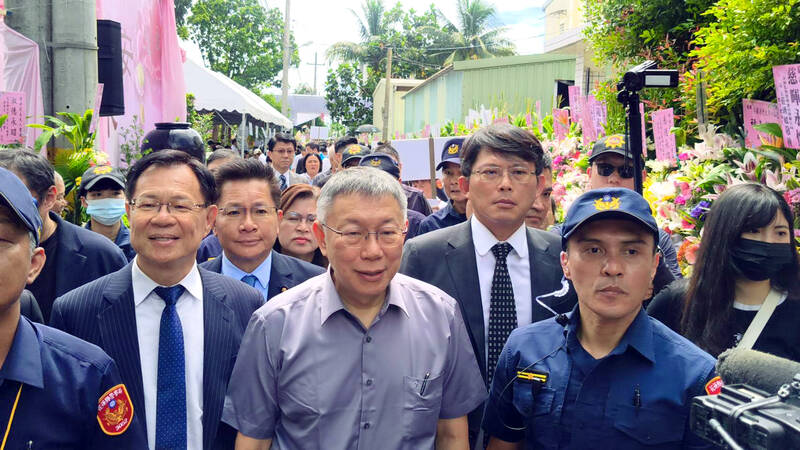The High Court yesterday overturned a Taipei District Court decision to release Taiwan People’s Party Chairman Ko Wen-je (柯文哲) and sent the case back to the lower court.
The Taipei District Prosecutors’ Office on Saturday questioned Ko amid a probe into alleged corruption involving the Core Pacific City development project during his time as Taipei mayor.
Core Pacific City, also known as Living Mall (京華城購物中心), was a shopping mall in Taipei’s Songshan District (松山) that has since been demolished.

Photo: Wang Ching-yi, Taipei Times
On Monday, the Taipei District Court granted a second motion by Ko’s attorney to release him without bail, a decision the prosecutors’ office appealed immediately.
A collegiate bench of High Court judges said in a ruling yesterday evening that there is substantial evidence implicating officials of Ko’s administration in alleged bribetaking from Core Pacific Group (威京集團) chairman Sheen Ching-jing (沈慶京).
Ko’s claims of ignorance about the alleged scheme while he approved changes to the project’s scope based on recommendations of experts at the Taipei Urban Planning Commission mean an investigation is warranted, it said.
The judge who granted Ko’s no-bail release failed to appropriately review the evidence presented by the prosecutors in its entirety, it said.
Meanwhile, an appeal by former Taipei deputy mayor Pong Cheng-sheng (彭振聲) was missing a signature and would be processed after the omission is rectified, the High Court said.
The Taipei District Court in the first ruling said that there were reasonable explanations for Ko to have unknowingly approved allegedly illegal amendments to the project’s terms.
The prosecutors did not prove there was sufficient cause to treat Ko as a suspect who wittingly accepted bribes, the lower court said.
Former Ko officials named as suspects in the case include Pong, former Department of Compulsory Military Service commissioner Chu Yea-hu (朱亞虎) and Urban Planning Commission Executive Secretary Shao Hsiu-pei (邵琇珮).
Ko is accused of conspiring with the officials to accept kickbacks from Sheen to change the floor area ratio for the project.
Lin Jou-min (林洲民), former head of the Taipei Urban Planning Commission, confirmed a Mirror Media report that he had expressed concern that the city government could be breaking the law if it agreed to change the FAR.
The objection was submitted in writing and the memorandum’s content agreed with findings in the Control Yuan’s corrective measure against the city in 2016, Lin said.
The Urban Planning Commission deemed the project to be a priority and thoroughly briefed Ko on it, Lin said.
“Whether Ko knew about [the project] is a question that we all can clearly answer in our mind,” he added.

CHAOS: Iranians took to the streets playing celebratory music after reports of Khamenei’s death on Saturday, while mourners also gathered in Tehran yesterday Iranian Supreme Leader Ayatollah Ali Khamenei was killed in a major attack on Iran launched by Israel and the US, throwing the future of the Islamic republic into doubt and raising the risk of regional instability. Iranian state television and the state-run IRNA news agency announced the 86-year-old’s death early yesterday. US President Donald Trump said it gave Iranians their “greatest chance” to “take back” their country. The announcements came after a joint US and Israeli aerial bombardment that targeted Iranian military and governmental sites. Trump said the “heavy and pinpoint bombing” would continue through the week or as long

TRUST: The KMT said it respected the US’ timing and considerations, and hoped it would continue to honor its commitments to helping Taiwan bolster its defenses and deterrence US President Donald Trump is delaying a multibillion-dollar arms sale to Taiwan to ensure his visit to Beijing is successful, a New York Times report said. The weapons sales package has stalled in the US Department of State, the report said, citing US officials it did not identify. The White House has told agencies not to push forward ahead of Trump’s meeting with Chinese President Xi Jinping (習近平), it said. The two last month held a phone call to discuss trade and geopolitical flashpoints ahead of the summit. Xi raised the Taiwan issue and urged the US to handle arms sales to

BIG SPENDERS: Foreign investors bought the most Taiwan equities since 2005, signaling confidence that an AI boom would continue to benefit chipmakers Taiwan Semiconductor Manufacturing Co’s (TSMC, 台積電) market capitalization swelled to US$2 trillion for the first time following a 4.25 percent rally in its American depositary receipts (ADR) overnight, putting the world’s biggest contract chipmaker sixth on the list of the world’s biggest companies by market capitalization, just behind Amazon.com Inc. The site CompaniesMarketcap.com ranked TSMC ahead of Saudi Aramco and Meta Platforms Inc. The Taiwanese company’s ADRs on Tuesday surged to US$385.75 on the New York Stock Exchange, as strong demand for artificial intelligence (AI) applications led to chip supply constraints and boost revenue growth to record-breaking levels. Each TSMC ADR represents

Pro-democracy media tycoon Jimmy Lai’s (黎智英) fraud conviction and prison sentence were yesterday overturned by a Hong Kong court, in a surprise legal decision that comes soon after Lai was jailed for 20 years on a separate national security charge. Judges Jeremy Poon (潘兆初), Anthea Pang (彭寶琴) and Derek Pang (彭偉昌) said in the judgement that they allowed the appeal from Lai, and another defendant in the case, to proceed, as a lower court judge had “erred.” “The Court of Appeal gave them leave to appeal against their conviction, allowed their appeals, quashed the convictions and set aside the sentences,” the judges